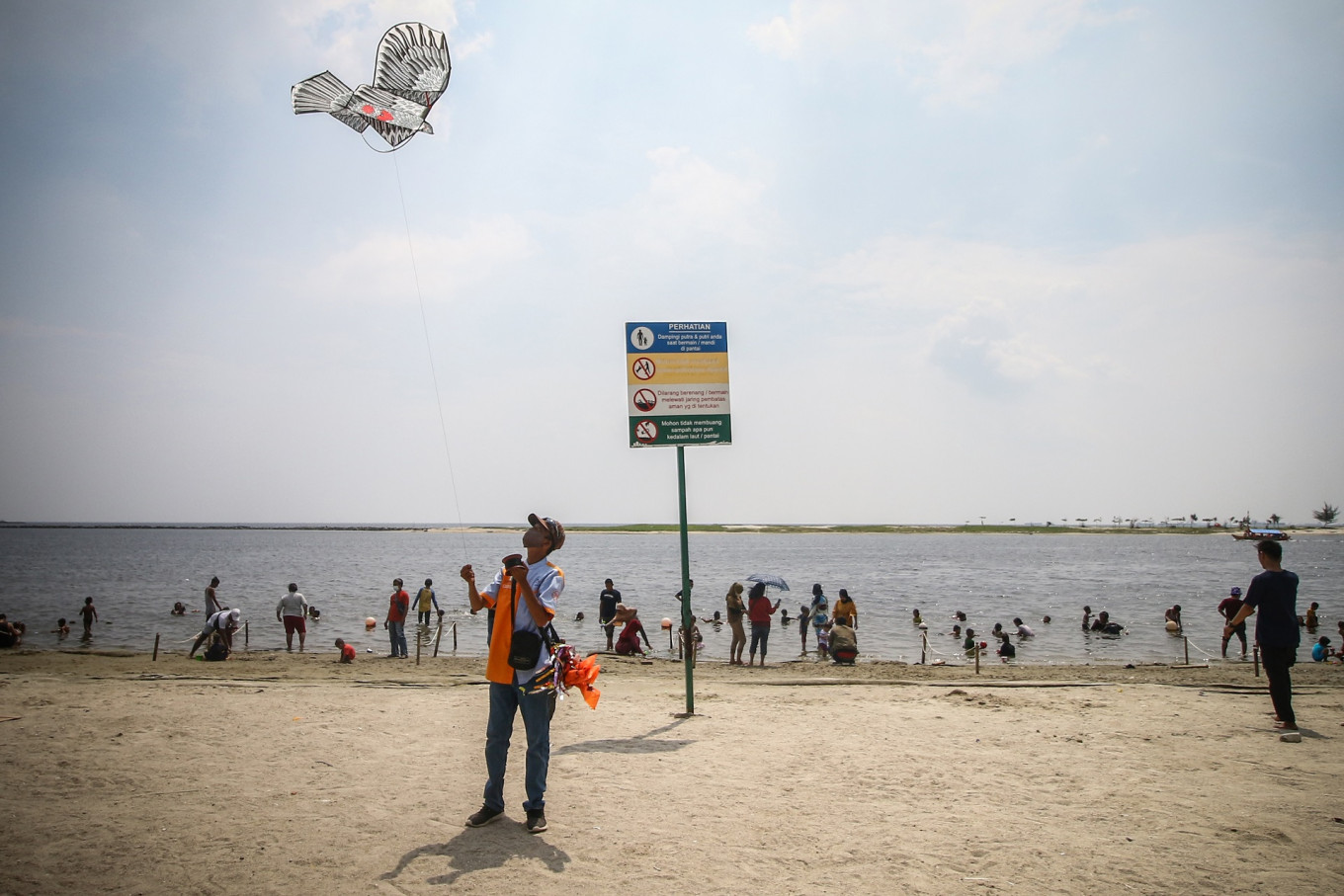Popular Reads
Top Results
Can't find what you're looking for?
View all search resultsPopular Reads
Top Results
Can't find what you're looking for?
View all search resultsStill hamstrung by COVID-19
As economic researchers have continued to caution, as have health scientists and government critics, recovering the economy hinges on bringing COVID-19 under control.
Change text size
Gift Premium Articles
to Anyone
 A kite vendor flies one of his products on May 14, 2021 at Carnaval Beach of Ancol Dreamland Park in North Jakarta. The negative quarterly contraction recorded in January-March 2021 and long-term analysis forecasting prolonged economic impacts from the pandemic, however, indicate that it's likely premature to start easing restrictions. (Antara/Rivan Awal Lingga)
A kite vendor flies one of his products on May 14, 2021 at Carnaval Beach of Ancol Dreamland Park in North Jakarta. The negative quarterly contraction recorded in January-March 2021 and long-term analysis forecasting prolonged economic impacts from the pandemic, however, indicate that it's likely premature to start easing restrictions. (Antara/Rivan Awal Lingga)
T
he 0.75 percent year-on-year gross domestic product contraction in the first quarter of this year was widely predicted, as it was set against the 2.9 percent positive growth recorded over the same period in 2020. But the negative quarterly growth of 0.96 percent, compared to the 0.42 percent contraction in the final quarter of 2020, showed a worrisome trend, as it indicated the unsteady and weak pace of economic recovery.
This reemphasizes a strong warning for the government that that none of its policies, however well designed, will be effective at fueling strong economic recovery before the pandemic is fully controlled. The economy will continue to be hamstrung by tight mobility restrictions if the high COVID-19 infection rate is not curbed at a steady pace.
We therefore don’t share the high optimism of several finance ministers that economic growth would exceed 5 percent to 7 percent in the second quarter, because this requires positive growth on a yearly basis that ranges from 10 percent to more than 12 percent. This range is set against second-quarter growth of minus 5.3 percent in 2020, which was especially affected by the reimposition of very strict mobility restrictions during the five weeks of the Ramadan and Idul Fitri holiday season, normally a peak period for household consumption every year.
This means that in the short term, including the second and third quarters this year, the economy will continue to run on a very weak foundation, especially because the pace of the mass vaccination drive has been much slower than planned due to the acute lack of vaccine supplies. Continued social distancing measures and travel restrictions, along with significant income and job losses, have weakened consumer confidence, while lingering policy uncertainty continues to weigh on private spending.
Worse still, analysts predict that the pandemic will likely have long-lasting effects on household, business and government demand because of the concomitant scarring of productivity and potential growth. The pandemic has weakened investment, while education disruption and prolonged unemployment have eroded human capital.
Statistics Indonesia (BPS) data released early this month showed that all contact-sensitive sectors, which comprise the most labor-intensive businesses such as manufacturing, trade, construction, mining, transportation, tourism and hospitality, contracted as a result of the mobility restrictions. This certainly had an adverse effect on household consumption, which accounts for more than 55 percent of GDP.
Developments over the past 20 weeks indicate that the fight against COVID-19 continues to suffer from inadequate policy approaches and utterly weak enforcement as regards the health protocols implemented to control transmission. It is no wonder that most domestic and international economic research institutes have revised down their growth projections for Indonesia this year from 5-6 percent to 4-5 percent.
The outlook for domestic and foreign direct investments is not promising either, as the technical and regulatory details for implementing the bold reform measures of the 2020 Job Creation Law will most likely be completed only in the second quarter.









